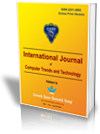User- And Query-Conditional Ranking for Web Databases
 | International Journal of Computer Trends and Technology (IJCTT) |  |
| © - November Issue 2013 by IJCTT Journal | ||
| Volume-5 Issue-1 | ||
| Year of Publication : 2013 | ||
| Authors :Mrs.D.Kalyani , Mrs. M.Suganya. |

Mrs.D.Kalyani , Mrs. M.Suganya."User- And Query-Conditional Ranking for Web Databases"International Journal of Computer Trends and Technology (IJCTT),V5(1):15-19 November Issue 2013 .ISSN 2231-2803.www.ijcttjournal.org. Published by Seventh Sense Research Group.
Abstract:- The emergence of the in-depth Web databases has given a new connotation to the concept of rankingquery results. Main aspect of this ranking framework is a workload of ranking functions, where each function act for an individual user’s preferences towards the results of a particular query. Database systems always help a Boolean query recovery modelie., result will be of True or False, where a selection query on a SQL database provides all tuples that fulfills the conditions of the query. This frequently brings confusion to the user, with results with so countless solutions: when the query isnot very selective based on condition, then too many outcomes may be in the answer.Weexperiment the obstacle of ranking the solutions to a database query when many tuples arereturned. In particular, we grantproposed system to tackle the problem for conjunctive and extentqueries, by holding and providing principles of probabilistic models from information retrieval fordatabase data. Proposed system is domain free and force data and workload statisticsand correlations. We assess the quality of our dealing with a user experiment on a real time database.Also, we propose and experimentally assess algorithms to effectively collect the topranked results, which show the scope of our ranking system.
References -
[1] M. K. Bergman. The deep web: Surfacing hidden value. Journal of Electronic Publishing, 7(1), 2001.
[2]. K. C.-C. Chang, B. He, C. Li, M. Patil, and Z. Zhang. Structured databases on the web: Observations and implications. SIGMOD Record, 33(3):61–70, 2004.
[3] M.K. Bergman, “The Deep Web: Surfacing Hidden Value,” J. Electronic Publishing, vol. 7, no. 1, pp. 41-50, 2001.
[4] BREESE, J.,HECKERMAN, D., AND KADIE, C. 1998. Empirical analysis of predictive algorithms for collaborativefiltering. In proceedings of the 14th Conference on Uncertainty in Artificial Intelligence
[5] Z. Song and N. Roussopoulos.K-nearest neighbor search for moving query point. In SSTD, pages 79–96, 2001.
Keywords :— ranking query, web database, deep web
